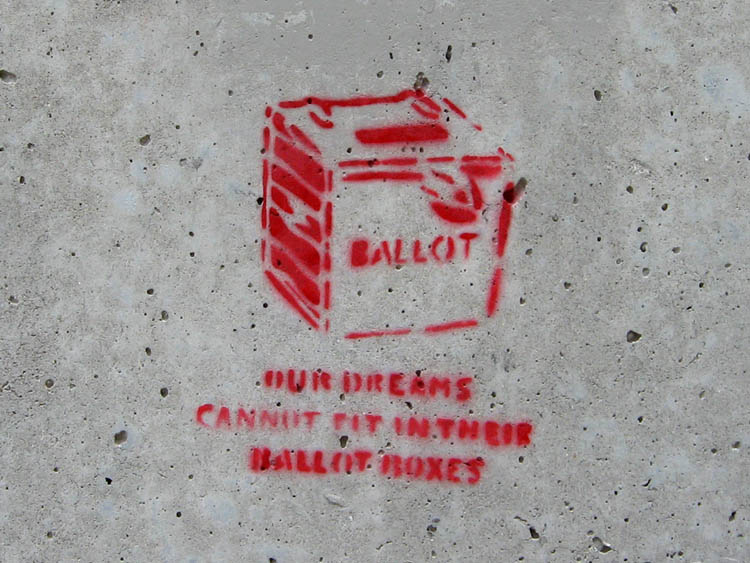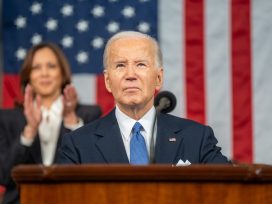Was Joe Biden’s presidency a mere break from the Trump movement? Just as Biden was elected in 2020, George Blecher wrote:
‘Pessimists fear that it will never be over – that the Trump phenomenon has not so much temporarily derailed American democracy but has revealed long-standing problems in the system itself, and profound distortions in the way Americans look at themselves.’
The pessimists may have got it right again. So what now? What to expect and how to prepare for Trump’s return to power?
This is our selection of articles to orient the reader on key issues. They outline how much the world has changed around Trump, and how his views have not. Covid-19, Russia’s full-scale invasion, a growing green economy and the dismantling of reproductive rights, have raised the stakes immensely high globally as Trump returns to the White House.

The Trumpist foreign policy

Image by Shannon Kringen, via Flickr.
By Cassia Scott-Jones
Kyiv and Moscow have been preparing for Trump’s potential return. His promise to end the war in 24 hours has been dismissed by both. In this article from New Eastern Europe, Cassia Scott-Jones writes on how this could eventually force Trump to change his position.

by Jeffrey C. Isaac
The escalating war in the Middle East opened a gap in US foreign policy. It became an issue on which Trump and Harris shared the same stance – with little to offer for potential democratic voters who support Palestine. Should these be blamed for not casting a protest vote against Trump? Jeffrey C. Isaac writes on uncommitted voters, via Public Seminar.

by Beata Górka-Winter
Beata Górka-Winter in New Eastern Europe on what to expect as Trump, who just a couple of months ago stated that he would ‘encourage Putin to attack’ the European countries that refuse to meet their financial pledges to NATO.

by Christopher Schaefer
The 2024 election marks a shift, or rather a return to Trump’s conditional relations with NATO. In 2017, Christopher Schaefer wrote on Trump’s unpredictability in international politics.

by James Kirchick
What can we understand from Trump’s Russian relation? In 2017, James Kirchick wrote on Republican Russophilia, and the paradox of Trump’s position. A position he’s kept alive and unchanged, even after Russia’s full-scale invasion in 2022.

by Ronald H. Linden
The relationship between the EU, US and China has undergone dramatic shifts since the last time Trump was elected, with a pandemic, wars and economies in decline. Leading up to the European Parliamentary elections, Ronald H. Linden wrote on what can be expected after this year of elections.

A democracy in peril

Stencil art in Madison, Wisconsin. Image taken on August 7, 2007, via Wikimedia commons.
by Erica Benner and Elze Vermaas
2024 has been a dramatic election year, that may flush the memories of 2016. With Trump’s first win, the Brexit vote, and a surging far-right movement across Europe, Erica Benner, author of Adventures in Democracy, asked herself: is democracy worth the trouble?
In this interview with the Green European Journal’s Elze Vermaas, Erica Benner talks about sustaining democracy, political pluralism and the least obvious enemies of democracy.

by Drew Mitnik
The idea of freedom was radically transformed under the last Trump administration. In his article ‘Fragments of a broken mirror’, George Blecher wrote that freedom became ‘a synonym for pure self-interest’. Could this transformation be what made Trump the most attractive president for Silicon Valley figures?
In this Green European Journal article, Drew Mitnik writes on how Trump opened the door for the tech world to enter politics, and how it affects the rest of the world in terms of information, technology and in turn: breaking down democracy.

Back on building the wall?
by Emmanuel Guerisoli
In 2016, after the San Bernardino Isis attack, Donald Trump promised he would ban Muslims from entering the US, which he proceeded to do the first moment he got the opportunity. Emmanuel Guerisoli writes on the history of travel bans, and why we can expect them to be reinstated as Trump returns to the White House, via Public Seminar.

by Mónica Salmón Gómez
The US migration system is already precarious and dangerous, and with Trump’s re-election it’s likely to grow even more dangerous. But it is in such contexts that a certain kind of radical solidarity emerges, Mónica Salmón Gómez writes on a small New York mutual aid network that welcomes migrant families for Public Seminar.

by Steve Max
The humanitarian argument for supporting a legal migration framework has been the centre of the democratic campaign, but they failed to stress the economic importance of immigration according to Steve Max. In his article for Public Seminar he writes on the domestic and international consequences of a closed border.

Reversing the transition?

Image via Marco Verch, via CCNULL.
by Clarence Edwards
Will Donald Trump mark the end of the US’ transition to green energy? Climate policy was certainly at stake in this election, and it is clear that Trump will not set any green goals in his time in office.
But Clarence Edwards of the Green European Journal argues that you shouldn’t be too pessimistic, whilst Trump will most certainly try to put a stop to what the Biden administration had in the making, the green economy has grown and changed since Trump was last in office.

Reproductive freedom
by Claire Potter and Felicia Kornbluh
The upheaval of Roe v. Wade in 2022, a judicial decision that had secured the federal right to abortion at 24 weeks for nearly 50 years, meant a new turn in US abortion policy. It also became one of the biggest issues in this election’s campaigning.
Trump and Vance’s plans, whilst inconsistent, point to an uncertain future for abortion rights in the US. In the debate on abortion rights, there is a legalistic obsession with the number of weeks before terminating a pregnancy, and this is not only true for the US.
In the beginning of 2024, Claire Potter interviewed Felicia Kornbluh, author of A Woman’s Life is a Human Life: My Mother, Our Neighbor, and the Journey from Reproductive Rights to Reproductive Justice (2023) in her podcast Why now? To talk about the dangers of the narrow debate on abortion –and what the meaning of reproductive freedom actually is. Listen to the episode here, or read the full transcript.
Episode 45: Why Abortion Alone Does Not Make Women Free by Claire Potter
Historian Felicia Kornbluh and I mark Roe v. Wade with a conversation about “A Woman’s Life Is a Human Life: My Mother, Our Neighbor, and the Journey from Reproductive Rights to Reproductive Freedom”
Read on Substack












